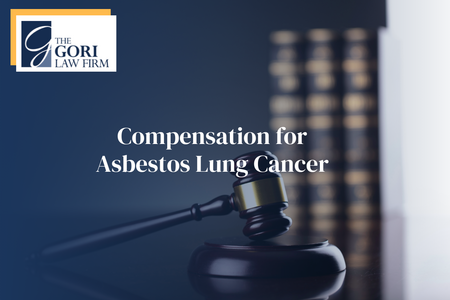Asbestos Lung Cancer
If you or a loved one have been diagnosed with lung cancer after being exposed to asbestos–even if it was decades ago–you may be able to pursue compensation for your suffering via a personal injury lawsuit, asbestos trust fund claim, or VA claim. When it comes to seeking compensation for lung cancer caused by asbestos, time is of the essence, as each potential avenue for compensation sets deadlines for patients to file.
At The Gori Law Firm, our attorneys have over 100 years of combined legal experience and have successfully handled countless asbestos lawsuits. Contact our team today for a free asbestos lung cancer case evaluation.

How Does Asbestos Cause Lung Cancer?
For decades, asbestos was the primary choice for insulation and fire-resistant construction materials across the country. While the use of the material began to decline in the late 1970s, when the dangers of asbestos exposure became more widely known, tens of millions of workers had already been exposed. Because symptoms typically do not manifest immediately after asbestos exposure, many people who were exposed decades ago are just now beginning to show signs of these asbestos-related illnesses like lung cancer, asbestosis, and mesothelioma.
Different asbestos-related diseases appear at different times and affect people in different ways. While mesothelioma is a cancer that develops in the lining of the lungs, chest cavity, or abdominal cavity, asbestos-related lung cancer develops inside the lung tissue itself. Both mesothelioma and asbestos lung cancer have a long latency period, and studies have shown that it takes 20 to 40 years or more for diseases caused by asbestos to show up.
Because asbestos exposure is the only known cause of mesothelioma, it is usually easier to prove a link between asbestos and mesothelioma than it is for a lung cancer diagnosis. In many cases, lung cancer has more than one cause–asbestos exposure, smoking, and family history could all contribute.
Signs and Symptoms of Asbestos Lung Cancer
The most common symptoms of asbestos-related lung cancer include chest pain, shortness of breath, and a persistent cough. Doctors can tell if lung cancer is caused by asbestos if they find asbestos fibers in the lungs, if the person also has a disease called asbestosis, or if the lining of the lungs has become thick and stiff. While a doctor does not need to determine the cause of a patient’s lung cancer to treat it, determining whether asbestos exposure contributed to the condition is necessary to seek compensation.
The symptoms, prognosis, and treatment options for asbestos lung cancer are typically the same as for any other non-asbestos-related lung cancer diagnosis. In any case, early diagnosis and correct diagnosis are crucial to the health of the patient and their legal ability to recover compensation for their illness.
Who is at Risk for Asbestos-Related Lung Cancer?
Occupational asbestos exposure refers to inhaling or ingesting asbestos fibers in a work environment and is most common in manufacturing, construction, and other blue-collar occupations. Those who have worked with or near asbestos-containing products for long periods of time are at the highest risk of developing asbestos-related diseases like lung cancer. However, many people were also exposed outside of work in their homes, schools, and churches or just by being around exposed workers who unknowingly carried asbestos fibers on their skin and clothing.
Jobs with the Highest Risk of Asbestos Exposure
In the mid-20th century, asbestos was a common component of products used in homes, workplaces, and industrial settings. Workers who dealt with insulation, flooring materials, shingles, brakes, gaskets, and more were at a particularly high risk of exposure. Today, over a million American workers continue to face occupational exposure, particularly in construction jobs. Some of the occupations with the highest risk of asbestos exposure include:
- Military personnel
- Mechanics
- Construction Workers
- Carpenters
- Electricians
- Maintenance Workers
- Boilermakers
- Plumbers and pipefitters
- Welders
- Insulation installers
- HVAC workers
- Machinists
- Firefighters
Veterans and Asbestos Lung Cancer
During the 1900s, every branch of the U.S. military used asbestos for various purposes, especially as insulation for ships, barracks, hangars, shipyards, protective clothing, and other equipment. Because of asbestos’ heavy use in shipbuilding, Navy veterans are at an especially high risk of developing asbestos-related diseases like lung cancer. Army veterans also have a high rate of developing the disease. If you are a veteran and have developed lung cancer after being exposed to asbestos during active duty, you may be eligible to receive compensation from the U.S. Department of Veterans Affairs.
Can You Sue for Asbestos-Related Lung Cancer?
If you or a loved one has been diagnosed with asbestos-related lung cancer, you may be able to pursue several legal options for compensation depending on the circumstances of your diagnosis. Your legal options may include:
- Personal injury lawsuits: These civil suits are typically filed against the manufacturers of the asbestos-containing products you were exposed to.
- Asbestos trust fund claims: Dozens of asbestos product manufacturers set aside money during bankruptcy proceedings to compensate past and future victims of exposure-related diseases. You may be able to file claims with multiple trust funds.
- VA claims: The VA provides compensation for veterans diagnosed with asbestos-related diseases. This compensation usually covers medical bills, lost wages, and long-term disability.
- Wrongful death claims: If your loved one died from asbestos-related lung cancer, you may be able to file a wrongful death lawsuit against the manufacturers of the products they were exposed to.
How Do I Prove Asbestos Exposure Caused My Lung Cancer?
To be successful in filing a lawsuit, trust fund claim, or VA claim for asbestos-related lung cancer, you will need to provide significant evidence that your diagnosis is related to asbestos exposure. This may include medical records, work history, and expert testimony. If you have developed lung cancer and you suspect it may be due to asbestos, your doctor may look for proof that you were exposed to asbestos, check if there are more asbestos fibers in your lungs than normal, and review your history for heavy exposure.
How Long Do I Have to File an Asbestos Lung Cancer Lawsuit?
Every state and asbestos trust fund has a unique statute of limitations during which people with asbestos cancer can file claims against negligent asbestos manufacturers. Most states have a 3-year post-diagnosis time limit to file suit, but some states allow as little as one year. It’s important to file as soon as possible after your diagnosis–if you miss the deadline, you may lose the opportunity to recover compensation to deal with the costs of your asbestos-related illness.
How Much Compensation Can You Get?
The value of your mesothelioma settlement or asbestos claim payout can vary greatly depending on the stage of your disease, your prognosis, the strength of your evidence, and how many different parties are found to have contributed to your asbestos exposure. However, the average settlement for asbestos-related lung cancer cases is approximately $100,000 but can vary greatly depending on the details of your individual case.
Asbestos Trust Funds for Lung Cancer Victims
Asbestos product manufacturers created dozens of asbestos trust funds in the late 1990s and early 2000s. These companies were ordered to create trust funds to compensate past and future victims of asbestos-related diseases caused by exposure to their products. These trust funds contain an estimated $30 billion today, and asbestos-related disease victims can often file claims with multiple trust funds to maximize their compensation.
The Asbestos Lung Cancer Lawsuit Process
The first step when filing a lawsuit with Gori Law is a free case evaluation. Once you decide to partner with our firm, our experienced attorneys will investigate your case and gather evidence to determine the source of your asbestos exposure, estimate the value of your claim, and determine who may be responsible.
In asbestos lung cancer cases, you must also have a doctor confirm that your cancer was primarily caused by exposure to asbestos. Our skilled attorneys will negotiate with the liable parties for a settlement or take your case to trial if negotiations fail.
How Long Does an Asbestos Lung Cancer Lawsuit Take?
How long asbestos lawsuits can take depends on the circumstances of your case. They can take anywhere from a few months to a few years to resolve. Trust funds are often the fastest way to receive compensation. If you need money for treatment urgently, you can often file trust fund claims while waiting for your lawsuit to proceed.
Frequently Asked Questions About Asbestos Lung Cancer
How Long Does It Take for Asbestos to Cause Lung Cancer?
It can take 10-50 years for asbestos-related lung cancer to develop after exposure.
Do I Need a Lawyer for an Asbestos Lung Cancer Claim?
Hiring a law firm with the experience and resources to investigate, determine liability, and file all available claims quickly can help you obtain full compensation for your injury. At The Gori Law Firm, our attorneys have the legal knowledge, experience, and commitment to our clients to fight for fair settlements and verdicts. We leave no stone unturned in investigating your claims.
Contact an Experienced Asbestos Lung Cancer Lawyer Today
At The Gori Law Firm, our asbestos-exposure attorneys have recovered more than $4 billion in compensation for people suffering from asbestos-related diseases across the United States. We work closely with every client to provide the personal support and resources they need throughout the legal process. If you or a loved one has been diagnosed with asbestos-related lung cancer, contact our team for a free case evaluation today by calling 618-659-9833 or filling out our online contact form.

